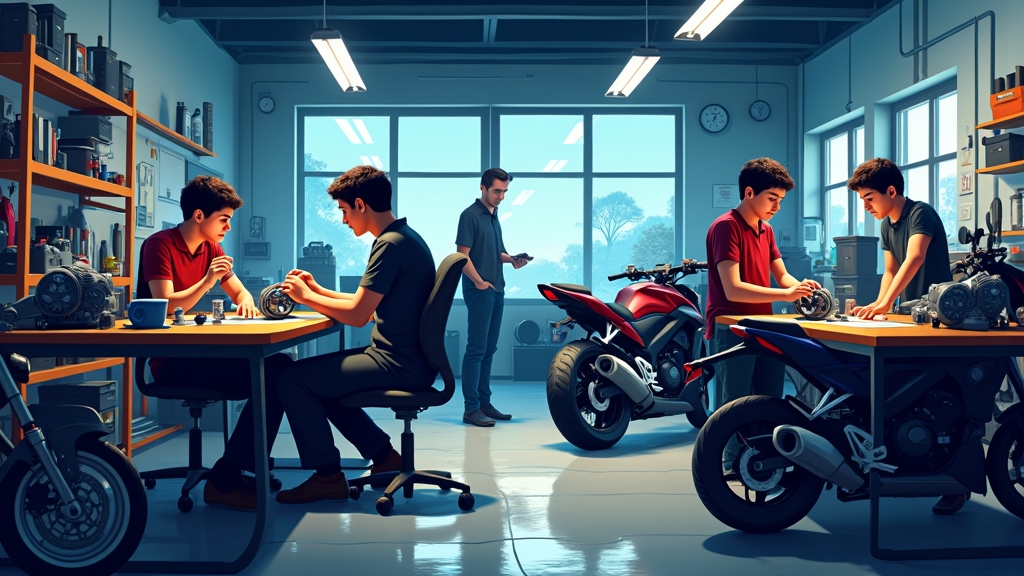The motorcycle sector in Brazil has grown significantly in recent years. With the increase in the fleet of motorcycles on the streets, the demand for qualified maintenance and repair professionals has also risen. Motorcycle mechanic courses are an excellent opportunity for those wishing to enter or specialize in this expanding market. In this article, we'll explore everything you need to know about the motorcycle mechanic course, from what you learn, through the advantages, to job opportunities and how to apply.
What is a Motorcycle Mechanic Course?
A motorcycle mechanic course is a professional training program that aims to enable individuals to carry out maintenance and repairs on motorcycles. This type of course covers a wide range of topics, from the basics to advanced repair techniques. Students learn about ignition systems, engines, transmission, electrical systems, brakes, suspension, and much more. In addition, the course provides practical and theoretical knowledge, preparing students to face real challenges in the workplace.
The duration of a motorcycle mechanic course can vary depending on the institution and the level of specialization desired. They range from shorter courses of around 3 months, focused on specific skills, to more extensive programs that can last up to 2 years and cover complete training. During the course, students have the opportunity to work in simulated environments that replicate the conditions of a real workshop, ensuring a richer and more practical learning experience.
The courses are offered by various technical education institutions, vocational schools and even by some automakers who want to train specialized professionals for their brands. The importance of choosing a renowned institution recognized by the market is essential, as it guarantees that the certificate obtained at the end of the course has value and recognition by employers.
One of the most attractive features of these courses is that they often don't require sophisticated prerequisites. All that is needed is for the student to have completed elementary school and to demonstrate an interest in and aptitude for technical learning. This broadens the range of opportunities for many young people who are looking for a practical profession with good pay.
Course content
The content covered in a motorcycle mechanic course is wide-ranging, covering everything from the basics to specialized technical knowledge. One of the main topics is the study of motorcycle engines. Students learn about the different types of engines, their components and how each one works, including lubrication, cooling and power systems.
Another relevant topic is the electrical system of motorcycles. With the advance of technology, modern motorcycles have complex electrical and electronic systems that require specific knowledge for maintenance and repair. The courses teach everything from reading electrical diagrams to identifying and solving problems with components such as the battery, ignition system and lights.
The transmission and suspension of motorcycles are also key topics. These systems are crucial to the safety and performance of motorcycles. Students learn how to identify problems, make adjustments and replace parts, ensuring that the motorcycle operates efficiently and safely. In addition, techniques for diagnosing and solving mechanical problems are covered.
Finally, a good motorcycle mechanic course also includes notions of occupational safety and customer service. Students are prepared to follow safety protocols during their activities and to provide quality customer service by understanding their customers' needs and communicating effectively.
Advantages of Taking a Motorcycle Mechanic Course
Choosing a motorcycle mechanic course offers several advantages for those looking to enter or specialize in the automotive job market. Firstly, the motorcycle market is booming, which generates a constant demand for qualified professionals. This translates into greater job opportunities and the potential for good salaries.
One of the main advantages is the practical training that these courses offer. Unlike other areas of knowledge that are mostly theoretical, motorcycle mechanics courses provide practical experience right from the start. This is fundamental for training a competent and safe professional, who knows how to apply theoretical knowledge in real situations.
In addition, flexible working is an attractive feature for many who choose this career. Motorcycle mechanics can choose to work in workshops, dealerships or even open their own business. This allows the professional to have greater control over their hours and earnings, depending on their skills and dedication.
Last but not least is the personal satisfaction that comes from working with something you're passionate about. Many motorcyclists and motorcycle enthusiasts choose this profession in order to always be close to what they love most. Working with motorcycles can be incredibly rewarding for those with a love of mechanics and two wheels.
How to choose the right course
Choosing the right motorcycle mechanic course is a crucial step in guaranteeing quality training and a good start to your career. The first step is to research the institutions offering the course. It's important to check that the school is recognized by the market and has a good employability rate among its former students.
Another point to consider is the structure offered by the institution. The course should have a well-equipped workshop that allows students to carry out practical activities. It is also important that the teaching staff is made up of experienced professionals who can share both theoretical knowledge and practical experience.
The curriculum is another aspect to evaluate. A good course should offer a comprehensive curriculum that covers all the fundamental areas of motorcycle mechanics. In addition, constantly updating the content to reflect new technologies and market trends is essential to train professionals who are able to deal with innovations in the sector.
Finally, the location and cost of the course are also factors that can influence your choice. It is important that the cost of the course is within your budget and that the location is accessible. Some institutions offer scholarships or partnerships with companies, which can be an excellent opportunity to facilitate access to quality education.
Job and career opportunities
The job market for motorcycle mechanics is very promising, especially in a country like Brazil, where the number of motorcycles in circulation grows every year. After completing a course, the professional will be able to work in a variety of areas, from small workshops to large dealerships.
In addition to formal employment opportunities, many motorcycle mechanics choose to open their own business. Having your own workshop can be a lucrative path, but it requires initial investment and entrepreneurial skills. For those who wish to follow this path, additional courses in business administration and management can be very useful.
Another career possibility for motorcycle mechanics is to specialize in specific makes or models. This can open doors to work in dealerships for specific brands or even in sports motorcycling teams, where the demand for specialized mechanics is always high.

Constant updating and specialization are key to career success. Attending workshops, industry fairs and other events can help keep professionals up to date on new technologies and market practices, as well as providing valuable networking opportunities.
Registration and How to Start
To start a motorcycle mechanic course, the first step is to choose the educational institution that best meets your needs and expectations. Once you've made your choice, it's important to check the enrollment requirements. In most cases, you need to have completed elementary school and be over 18.
Once you've made your choice, the next step is to register. Many schools offer the possibility of applying online via their websites, which makes the process much easier. It's important to be aware of the application deadlines and the documentation required, which usually includes ID, CPF, proof of schooling and proof of residence.
After applying, it is common for institutions to carry out a selection process, which may include aptitude tests or interviews. It's important to prepare for these stages, showing interest and motivation for your chosen course.
Finally, once you have passed the selection process, all you have to do is wait for classes to start and dedicate yourself to absorbing all the knowledge on offer. During the course, it's a good idea to look for internship opportunities or additional practical experience, which will further enrich your training and make it easier to enter the job market.
Conclusion
The motorcycle mechanic course is an excellent opportunity for those looking for a practical and promising career. With the growth of the motorcycle market, the demand for qualified professionals is only set to increase. The technical training offered by these courses prepares students to face the day-to-day challenges of a workshop, as well as opening doors to various job opportunities and professional growth. If you are interested in mechanics and like motorcycles, this could be the ideal career choice for you.
FAQ
What are the prerequisites for enrolling in a motorcycle mechanic course?
Generally, you need to have completed elementary school and be over 18.
How long does a motorcycle mechanic course last?
The duration can vary, but generally courses last between 3 months and 2 years.
Is the certificate for a motorcycle mechanic course recognized by the market?
Yes, as long as the institution is recognized and has a good reputation.
What is the average salary of a motorcycle mechanic in Brazil?
Salaries can vary, but the average starting salary is between R$ 1,500 and R$ 2,500 per month, which can increase with experience.
Can I open my own workshop after completing the course?
Yes, many mechanics choose to open their own business after gaining experience.
Are there online courses in motorcycle mechanics?
Yes, some courses offer distance learning, but it's important to look for those that include face-to-face practice.
Do I need to buy tools for the course?
Generally, institutions provide the necessary tools during practical lessons.
What should I consider when choosing an institution for the course?
Consider the institution's reputation, structure, teaching staff and curriculum.
Are there any specializations within motorcycle mechanics?
Yes, it is possible to specialize in certain brands or specific systems.
Does the motorcycle mechanic course include entrepreneurship lessons?
Some courses offer management and entrepreneurship modules, but this is not the norm.
How can I catch up after completing the course?
Participating in workshops, industry fairs and events on new technologies.
Can I work in motorcycle sports teams?
Yes, but you generally need to have experience and possibly specialize in high-performance motorcycles.
Is there a demand for motorcycle mechanics throughout Brazil?
Yes, demand is high in many regions, especially big cities.
Is the motorcycle mechanic course expensive?
Prices vary, but there are affordable options and some institutions offer scholarships.
What should I do if I don't understand any part of the course?
Seek out the instructor for questions and, if necessary, do extra revision or look for supplementary materials.



